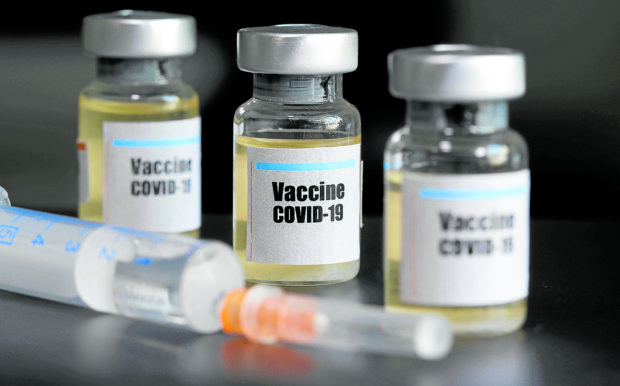Poorest countries can expect vaccines within weeks: WHO

Small bottles labeled with a “Vaccine COVID-19” sticker and a medical syringe are seen in this illustration taken taken April 10, 2020. REUTERS/Dado Ruvic/File Photo
GENEVA, Switzerland – The world’s poorest countries can expect to start receiving their first COVID-19 vaccine doses between the end of January and mid-February, the World Health Organization said Thursday.
Vaccination is already under way in some of the world’s wealthiest nations, including the United States, Britain, European Union countries and Canada.
Covax, the globally-pooled vaccine procurement and distribution effort, has struck agreements to secure two billion doses — and the first of those will start rolling out within weeks, said the WHO’s head of vaccines, Kate O’Brien.
Covax aims to secure vaccines for 20 percent of the population in each participating country by the end of the year, with funding covered for the 92 lower- and lower-middle income economies involved in the scheme.
It is co-led by the WHO, the Gavi vaccine alliance and the Coalition for Epidemic Preparedness Innovations (CEPI).
Article continues after this advertisementAsked how quickly lower-income African nations would get vaccines, O’Brien told a WHO live social media event: “The facility has access to over two billion doses of vaccine.
Article continues after this advertisement“We will start to deliver those vaccines probably by the end of January, and, if not, certainly by early February and mid-February.
“That’s how countries in Africa and South Asia, and other countries around the world of these 92 that are less able to afford vaccines, are actually going to get vaccines.”
Vaccines pipeline
The WHO granted emergency validation to the Pfizer-BioNTech vaccine on December 31, paving the way for countries worldwide to give swift approval to its import and distribution.
According to the WHO’s overview of candidate vaccines, 63 have been tested on humans, 21 of which reached final-stage mass testing.
A further 172 candidate vaccines are being developed in laboratories with a view to eventual human trials.
“There is a really big pipeline of vaccines that are coming through,” said O’Brien.
“We are in active review of the data on other vaccines and we do expect to be emergency-use listing additional vaccines in the coming weeks and the next months.
“We have 15 manufacturers that have contacted us believing that they have the data that are required to meet these highest standards.”
As for the new mutations of the virus detected in Britain and South Africa, WHO experts have said that while they seem more transmissible, there is no indication that the current vaccines would not work against those variants — and the vaccines are easily adaptable in any case.
“The evaluation about whether the existing vaccines will be impacted at all is under way,” said O’Brien.
However, “the kinds of changes being seen in these variants are not felt to be likely to change the impact”, she added.
O’Brien said it was too early to tell how long protection would last for following vaccination, and the WHO had no data yet to make any recommendations on receiving doses of different vaccines, having fully reviewed only the Pfizer-BioNTech jab.
She said prospective recipients should be aware it is not uncommon to feel unwell or have a sore arm after receiving a shot.
“Up to a third of people are going to get a headache or not feel well for perhaps 24 hours; the data says sometimes up to 48 hours,” she said.
“It is your body’s immune response that is actually turning on.
“You might not feel at your best for the first couple of days, but there’s a reason for it: something good is happening in your body.”
gsg
For more news about the novel coronavirus click here.
What you need to know about Coronavirus.
For more information on COVID-19, call the DOH Hotline: (02) 86517800 local 1149/1150.
The Inquirer Foundation supports our healthcare frontliners and is still accepting cash donations to be deposited at Banco de Oro (BDO) current account #007960018860 or donate through PayMaya using this link.